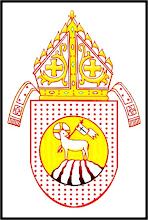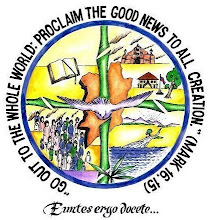
The event, which had the theme “THAT CHRIST BE FORMED IN US”, had the following objectives: to gather in the spirit of communion in mission the diocesan catechetical directors; to undertake the basic formation for catechetical directors in the framework of the GDC and NCDP ’07; and finally, to identify a plan of action for catechetical directors.
Our Chairman, Most Rev. Socrates B. Villegas, DD commenced the five-day course with an inspiring Overview of the whole Training Program, during their orientation on the first day.
Participants were supplied on their second day, with ample information coming from invited speakers starting off with Rev. Msgr. Hernando Guanzon (from the Diocese of Balanga), who gave his Theological Reflections Regarding the Ministry. CBCP Assistant Secretary General Msgr. Joselito Asis followed afterwards with his conference on the Canonical Provisions on Catechetical Instruction in the 1983 Code of Canon Law. I handled the 4th and 5th Conferences which covers the Principles of Pastoral Management.
Heavy but inspiring sessions also filled the third day, starting with their first speaker, ECCCE’s Chairman Emeritus and highly respected Archbishop of Caceres, Most Rev. Leonardo Legaspi, OP, DD, who covered the 6th and 7th Conferences with his lecture “Toward a Practical Sketch of ECCCE’s Vision of Catechesis”. Two exceedingly experienced catechetical coordinators – Ms. Ophine Javier (from the diocese of Novaliches) and Ms. Annette Angeles (from the diocese of Kalookan) - handled the 8th conference which is about the Catechetical Methodology based on the New NCDP.
Most Rev. Gilbert Garcera, DD (Bishop of Daet, ECCCE’s Vice Chairman and the National Director of the Pontifical Mission Societies of the Philippines) presented on the 4th day, the 9th conference of the course - Organization, Personnel and Resources of Catechesis which comprise Chapter VI of the New NCDP. The 10th and last conference was rather distinct from the previous conferences since it is a sharing of Catechetical Experiences coming from the 3 major regions of the country - Luzon, Visayas and Mindanao. Representing Northern Luzon is Abbot Santos Rabang who gave a clear picture of the Catechetical Praxis in Nueva Segovia. The Mindanao group on the other hand was represented by Fr. Bobby Cena and Fr. Noel Pedregosa who presented their Journey Series, a project of the diocese of Malaybalay. The last sharing came from the Visayas region represented by Msgr. John Luza, who gave an illustration of the Catechesis in the Archdiocese of Capiz.
During the course of the said assembly, series of Workshops were also conducted to give the participants enough time to interact with fellow catechetical directors and so that we can also assess their thoughts and feelings about the training program.
A great majority of the respondents appreciated all the topics given to them. They found them relevant and significant to their work as diocesan catechetical directors more particularly the one on Pastoral Management. Those who are at a loss in their assignment in the catechetical ministry were given direction and were enlightened on the real importance of catechesis in the Church’s mission. They were challenged to be good shepherds of the flock given to them. More importantly, they were inspired to move on with their mission as ministers, guided by the Vision of Catechesis.
Through the workshops, we were also able to have a clear view of the actual situation in their respective archdiocese, diocese, prelature or apostolic vicariate. These collated data will be of great help to the Commission in our evaluation of the present catechetical scenario in the Philippines and the areas which need improvement.
ORGANIZATIONAL ASSESSMENT
Responses were categorized into STRENGTHS and WEAKNESSES on each area /field: DIOCESE, DIOCESAN CATECHETICAL OFFICE, PARISH, PRESBYTERIUM, and the CATECHISTS.
Allow me to share with you the collated data which are noteworthy:
A. THE STRENGTHS (LIGHTS):
In general, their respective dioceses and as well as down to the parishes, have shown full support for the catechetical ministry, spearheaded by their good bishop who believes that Catechesis should be one of the main thrusts of the diocese. Assistance comes in these forms:
1. catechetical and evangelization program is top priority in the pastoral plan
2. funds / financial support / annual budget for the ministry
3. generally committed and supportive clergy (esp. the young ones)
4. a full-time diocesan catechetical director / priest-director in the parish and vicariate level
5. diocesan, vicarial, and parochial gatherings and on-going formation of catechists
6. dedicated, well-trained, industrious and competent staff and coordinators
7. presence of active, faithful and dedicated volunteer catechists and full- time catechists with a strong sense of mission and willing to be formed
8. regular salary for staff, coordinators and full-time catechists and other benefits such as SSS, Philhealth, etc.
9. a well-equipped diocesan catechetical office and formation center / parish catechetical office
10. availability of catechetical materials
11. support from some religious congregations through personnel
12. the ministry as the fund raising beneficiary
13. allocated funds for the diocesan and parochial catechetical program
14. supportive parishioners
15. regular meetings and coordination
B. However, there are also some WEAKNESSES (SHADOWS) which hinder in the implementation of the catechetical program in their dioceses / parishes:
Among those noted were:
1. insufficient number of catechists, particularly volunteer catechists
2. lack of personnel / staff and facilities
3. incompetent catechists / predominantly old, retired / low educational attainment
4. lack of financial support / funds are not enough
5. no formation house
6. lack of cooperation from the parish-level
7. weak, sporadic or no clear catechetical program / no improvement
8. lack of instructional materials / some are using recycled materials
9. lack of technical equipment
10. the diocesan office is too small or there is no office at all that allow compensation for the staff
11. unavailability of competent and trained catechetical director
12. lack of coordination with some parishes
13. tension in the interpersonal relationship between the pastor, coordinators and the catechists themselves
14. lack of support and follow-up from some parish priests
15. some have no parish catechetical office
16. lack of support in the catechetical programs and activities
17. old style of catechesis
18. only few parishes send volunteer catechists for training
19. lack of competent personnel / coordinators to be trained
20. lack of system organization
21. some public schools are not receptive
22. indifference to the ministry
23. lack of training, formation and on-going studies about the development in Catechesis
24. catechists are not prioritized
25. focused mainly on “May Catechesis”
26. inadequate remuneration
ENVIRONMENTAL SCANNING
A. It was rather inspiring to know that regular meetings are being held in their respective Ecclesiastical provinces for coordination and collaboration among its covered dioceses in order to share and “compare notes” regarding their catechetical programs and experiences and as well as discuss ways on how to improve the ministry.
However, in spite these opportunities mentioned in this area / field, 3 major factors pose as threats to this undertaking: 1) Financial (Lack of Funds); 2) Attendance (Conflict of Schedules); and 3) Lack or No Vision at all.
B. Tie-ups with government agencies, the Department of Education in particular (for allowing the teaching of catechesis in the public schools) and their respective local government units, have been quite beneficial for the ministry. They are supportive, cooperative and participative in the various catechetical programs.
Some agencies, on the other hand, pose a threat to our advocacy, particularly the programs of the Department of Health and its nationwide campaign on Reproductive Health and Population Management which are opposed to the Church’s teachings.
C. In the field of Resource Mobilization – some areas are fortunate to tap funding agencies to help the ministry while a great majority is just hopeful or is still searching for organizations or foundations that will help them financially in the implementation of their programs. Others are hopeless and awkward to work on this particular undertaking.
D. Collaboration with Catholic Schools has been beneficial to the ministry as well, especially on the financial aspect, and must be maximized particularly through its Student-Catechist Program / Adopt a Public School Program in support of the deficiency in the number of volunteer catechists. However, there are still problems experienced such as intimidation and lack of coordination with the ministry. Some student – catechists have no proper training and formation and are only obliged to do so as part of their curriculum. There are also cases where there is a lack of coordination between the parish priest (and the diocesan catechetical ministry) and the religious congregation managing the schools.
E. Through the permission of the Department of Education, our catechists are able to give religious instruction in the Public Schools. It is one of the best venues for evangelization especially to our youth who are very thirsty in terms of religious guidance.
Through proper coordination between the school, the parish priest and the catechists, our young people are able to receive the sacraments of the Catholic Church.
In spite of this, it is still heartbreaking to hear of cases where the principal is not that receptive of the program, and worse, would allow our brother fundamentalists instead. Financial constraint is also a major problem, as usual.
In CONCLUSION, the Summer Catechetical Institute for Priests turned out to be successful and the participants themselves are looking forward to this as a yearly activity of the Commission. We shall try to improve the program by the year through their recommendations and suggestions regarding possible activities, venue, topics to be discussed and speakers as well.



No comments:
Post a Comment